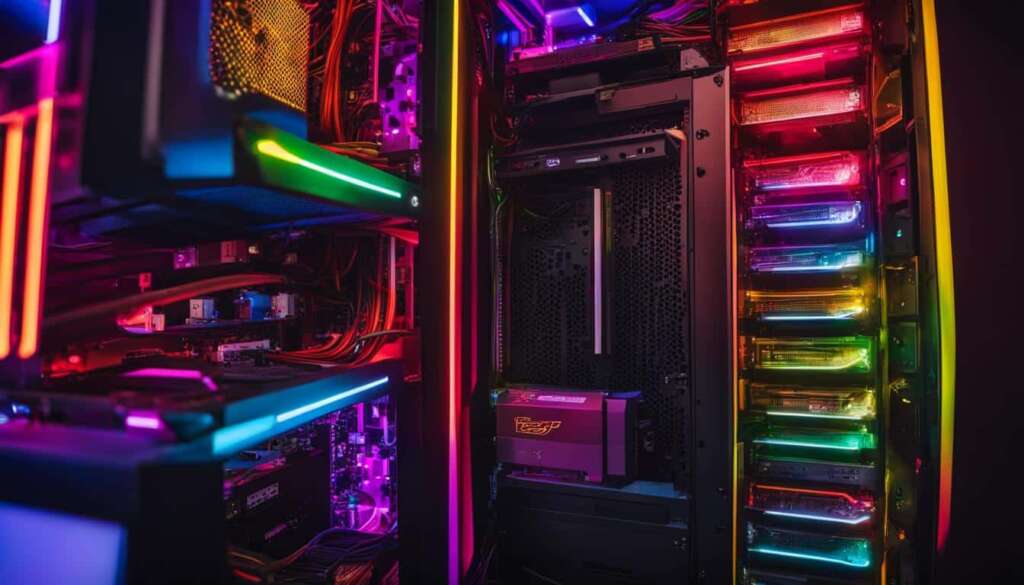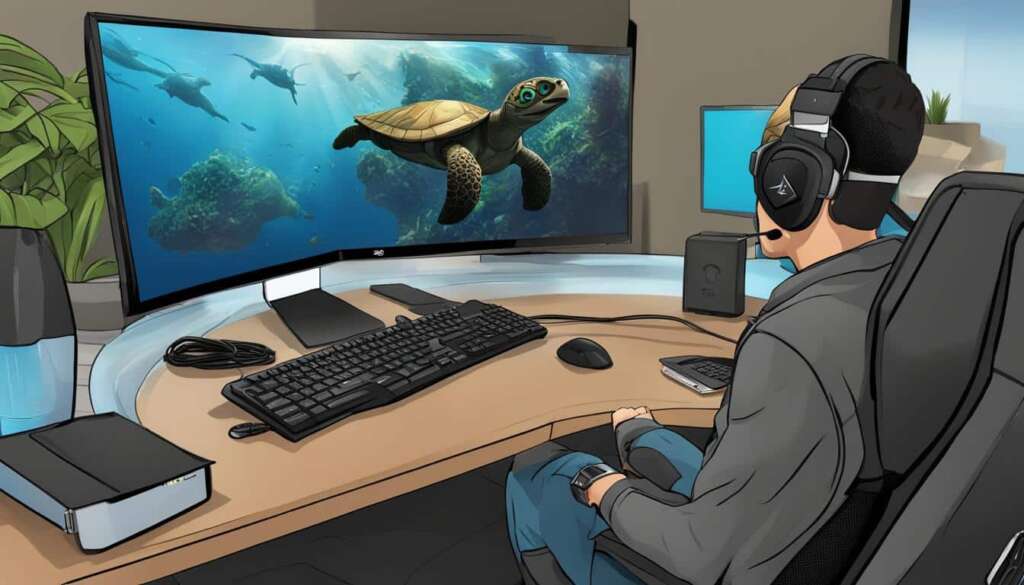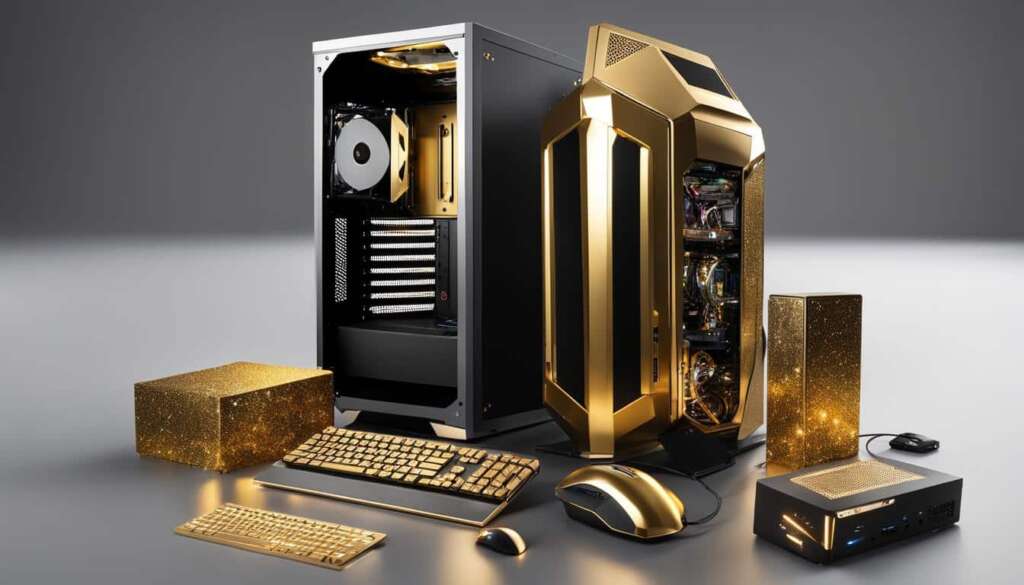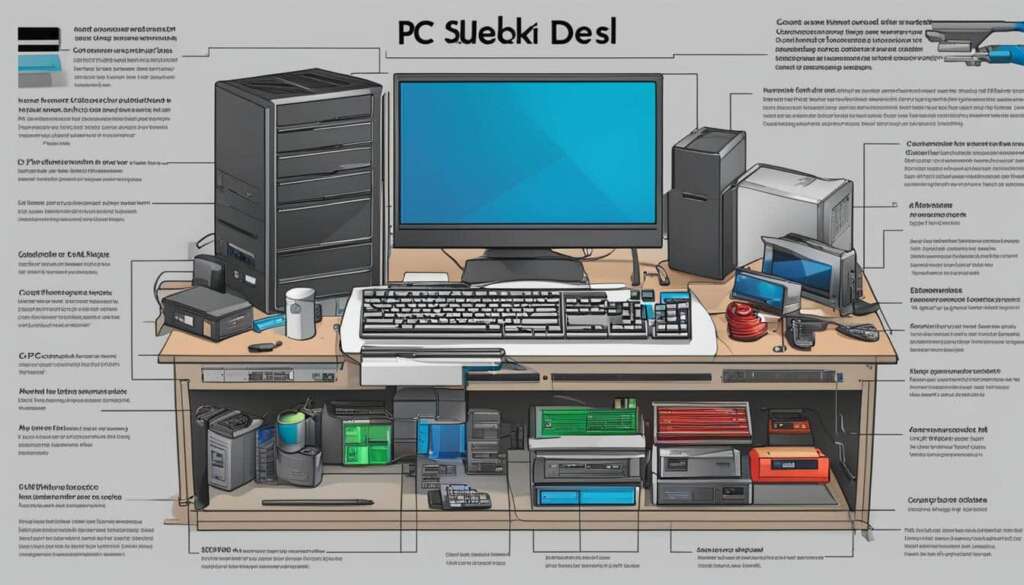Table of Contents
Gaming PCs have become increasingly popular among gamers around the world. However, one common concern that arises when considering a gaming PC is the cost involved. Understanding the factors that contribute to the price of a gaming PC is essential to make an informed decision and to avoid overspending.
The gaming PC cost is influenced by various factors, and the current volatility of the PC gaming component market only adds to the unpredictability. In the past, a decent gaming PC would typically cost between $600 and $700. However, with the fluctuating prices of components, it’s crucial to be cautious and stay updated with the market conditions.
Factors such as monitor resolution, frame rate, graphics settings, and the types of games desired can all impact the price of a gaming PC. Higher monitor resolutions, such as 1440p or 4K, require more powerful hardware, resulting in a higher cost. Achieving higher frame rates and selecting graphics settings from low to ultra also demand better components, contributing to the overall expense. Additionally, the types of games a gamer intends to play can affect the cost of necessary components.
Whether you choose to build your own gaming PC or buy a prebuilt system, it’s important to consider customization options and price comparisons. Building a gaming PC allows for greater control over component selection and potential cost savings. On the other hand, buying a prebuilt gaming PC offers convenience and ease of use. Reputable manufacturers such as iBUYPOWER, Skytech, MSI, Alienware, and Acer are popular choices for those considering prebuilt systems.
By understanding the factors affecting gaming PC pricing and considering the options available, you can make an informed decision that suits your preferences, budget, and technical knowledge.
Factors Affecting Gaming PC Pricing
The pricing of a gaming PC is influenced by several factors. These factors include the desired monitor resolution, frame rate, graphics settings, and types of games the user intends to play. Let’s dive deeper into each of these components:
Monitor Resolution
When it comes to monitor resolution, higher resolutions such as 1440p or 4K provide a more immersive gaming experience. However, achieving these resolutions requires more powerful hardware, which can increase the overall cost of a gaming PC.
Frame Rate
Frame rate, measured in frames per second (fps), determines how smoothly the game is displayed on the screen. Higher frame rates result in a more fluid and responsive gameplay experience. To achieve higher frame rates, a gaming PC needs more powerful components, which can also impact the price.
Graphics Settings
The graphics settings in a game dictate the level of detail and visual fidelity. From low to ultra settings, each increment demands better hardware to render the graphics. The higher the settings, the more powerful the PC’s components need to be, resulting in increased costs.
Types of Games
The types of games a gamer intends to play also affect the price of a gaming PC. Less demanding games, such as indie titles or older games, may require less powerful hardware and, therefore, cost less. On the other hand, modern AAA games with high resolutions and graphics settings demand more expensive components, which can contribute to a higher price tag.
Considering these factors, the estimated price range for gaming PCs can vary. Gamers should assess their preferences, budget, and the specific requirements of the games they want to play to make an informed decision.
Gaming PC Pricing Factors Summarized:
| Factors | Description |
|---|---|
| Monitor Resolution | Higher resolutions require more powerful hardware, increasing the cost. |
| Frame Rate | Higher frame rates necessitate better components, impacting the price. |
| Graphics Settings | From low to ultra settings, better hardware is needed, influencing the cost. |
| Types of Games | Less demanding games cost less, while AAA titles demand costlier components. |
Understanding these factors will help gamers make informed decisions when choosing a gaming PC that fits their needs and budget.
Building vs. Buying a Gaming PC
When it comes to getting a gaming PC, you have two main options: building your own or buying a prebuilt system. Both choices have their pros and cons, so it’s essential to consider your preferences, budget, and technical knowledge before deciding.
Building a gaming PC gives you the freedom to customize every aspect of your rig. You have complete control over the components chosen, allowing you to prioritize performance, aesthetics, or any specific requirements you may have. Additionally, building your own gaming PC can potentially save you money. By waiting for sales or finding the best deals, you can maximize your budget and get more bang for your buck. Furthermore, building offers better upgradability, allowing you to easily replace or upgrade individual parts, ensuring your system stays up to date.
On the other hand, buying a prebuilt gaming PC offers convenience and ease of use. These systems come ready to use out of the box, saving you time and effort. Prebuilt PCs also often come with warranties and support, giving you peace of mind in case anything goes wrong. However, it’s worth noting that prebuilt options can sometimes be more expensive compared to building your own. That being said, it’s advisable to go for reputable manufacturers when purchasing a prebuilt gaming PC. Some well-known brands in the market include iBUYPOWER, Skytech, MSI, Alienware, and Acer.
Ultimately, the choice between building and buying a gaming PC boils down to your personal preferences, budget, and technical knowledge. If you enjoy tinkering with hardware, have specific requirements, or want to get the most out of your budget, building your own PC may be the way to go. However, if convenience, time-saving, and peace of mind are more important to you, buying a prebuilt gaming PC from a reputable manufacturer might be the better option. Lastly, it is essential to consider additional expenses such as monitors, keyboards, mice, headsets, and operating systems when budgeting for a complete gaming PC setup.
FAQ
How much does a gaming PC cost?
The cost of a gaming PC can vary depending on various factors, including the specific components and specifications desired. In the past, a respectable gaming PC would typically cost between $600 and $700. However, with the current volatility of the PC gaming component market, prices have become more unpredictable.
What factors influence the pricing of a gaming PC?
The pricing of a gaming PC is influenced by several factors. These include the desired monitor resolution, frame rate, graphics settings, and the types of games a gamer intends to play. Higher resolutions, such as 1440p or 4K, and achieving higher frame rates require more powerful hardware and therefore increase the price. Graphics settings also demand better hardware and can significantly affect the cost. Additionally, modern AAA games with high resolutions and graphics settings demand more expensive components.
Should I build or buy a gaming PC?
When considering a gaming PC, there are two main options: building your own or buying a prebuilt system. Building a gaming PC allows for customization and potential cost savings. On the other hand, buying a prebuilt gaming PC provides convenience and ease of use. The choice between building and buying depends on individual preferences, budget, and technical knowledge. Additional expenses such as monitors, keyboards, mice, headsets, and operating systems should also be considered when budgeting for a gaming PC setup.







